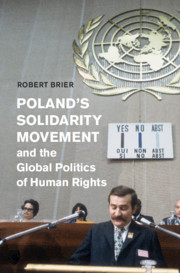Book contents
- Poland’s Solidarity Movement and the Global Politics of Human Rights
- Human Rights in History
- Poland’s Solidarity Movement and the Global Politics of Human Rights
- Copyright page
- Dedication
- Contents
- Acknowledgments
- Note on Geographical Regions
- Note on Cited Primary Documents
- Abbreviations
- Introduction
- 1 The Rise of Dissent in Poland
- 2 Dissent and the Politics of Human Rights
- 3 The Principle of Noninterference as Laid Down in the Helsinki Final Act
- 4 The End of the Ideological Age
- 5 Solidarity, Human Rights, and Anti-Totalitarianism in France
- 6 The “Bedrock of Human Rights”
- 7 Letters from Prison
- 8 Lech Wałęsa, the Symbolism of the Nobel Peace Prize, and Global Human Rights Culture
- 9 General Pinochecki
- 10 Human Rights and the End of the Cold War
- Epilogue
- Bibliography
- Index
2 - Dissent and the Politics of Human Rights
Published online by Cambridge University Press: 28 May 2021
- Poland’s Solidarity Movement and the Global Politics of Human Rights
- Human Rights in History
- Poland’s Solidarity Movement and the Global Politics of Human Rights
- Copyright page
- Dedication
- Contents
- Acknowledgments
- Note on Geographical Regions
- Note on Cited Primary Documents
- Abbreviations
- Introduction
- 1 The Rise of Dissent in Poland
- 2 Dissent and the Politics of Human Rights
- 3 The Principle of Noninterference as Laid Down in the Helsinki Final Act
- 4 The End of the Ideological Age
- 5 Solidarity, Human Rights, and Anti-Totalitarianism in France
- 6 The “Bedrock of Human Rights”
- 7 Letters from Prison
- 8 Lech Wałęsa, the Symbolism of the Nobel Peace Prize, and Global Human Rights Culture
- 9 General Pinochecki
- 10 Human Rights and the End of the Cold War
- Epilogue
- Bibliography
- Index
Summary
This chapter reconstructs the specific human rights language, or vernacular, of Polish dissent. Its central thesis is that Polish nonconformist intellectuals understood human rights in a profoundly political way. To support this thesis, this chapter analyzes the two main ideas of Polish human rights discourses: the dissidents’ interpretation of the concept of totalitarianism and the view that humans beings were simultaneously endowed with an inalienable dignity and enmeshed in social relations and cultural norms. On this basis, this chapter shows that Polish dissidents saw the issues that were usually associated with human rights work, e.g. defending one’s private sphere or protecting people from repression, asmeans to an end: the reclaiming of the public sphere from the totalitarian leviathan.Expressing an unalienable human dignity, human rights were seen as a means of breaking the totalitarian system’s grip on the public sphere by creating pockets of freedom where people could speak their minds freely and communicate with each other to tackle their shared concerns. In the discourse of the dissidents, human rights were understood not as antipolitical alternatives tovisions of social change or even to politics as such but as indissoluble linked to questions of collective agency and struggles for social justice.
Keywords
- Type
- Chapter
- Information
- Publisher: Cambridge University PressPrint publication year: 2021

